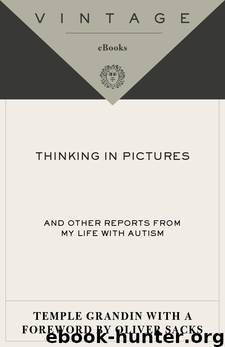Thinking in Pictures by Temple Grandin

Author:Temple Grandin [Grandin, Temple]
Language: eng
Format: epub
ISBN: 978-0-307-54803-0
Publisher: Knopf Doubleday Publishing Group
Published: 2006-03-25T16:00:00+00:00
Medications for Autism
Today there are many new drug treatments that can be really helpful to people with autism. These medications are especially useful for problems which occur after puberty. Unfortunately, many medical professionals do not know how to prescribe them properly. At autism meetings I have heard countless horror stories of how giving the wrong drug to an autistic with epilepsy can cause grand mal seizures or how doctors make zombies out of people by giving them enough neuroleptics to put a horse to sleep. Parents have also told me about serious side effects; one autistic adult went berserk and wrecked a room because of an excessive dose of an antidepressant, and another slept all day because he was put on a cocktail of high doses of six different drugs.
The proper use of medications is part of a good autism program, but it is not a substitute for the proper educational or social programs. Medication can reduce anxiety, but it will not inspire a person the way a good teacher can. It seems that some people with autism are given so many powerful drugs that they act as a chemical straitjacket. An effective medication should work at a reasonable dose, and it should have a fairly dramatic obvious effect. If a drug has a negligible effect, it's probably not worth taking. Likewise, medications that work should be used and drugs that don't work should be discontinued. Since autism has such a wide range of symptoms, a drug that works for one person may be worthless for somebody else.
Research studies show that new antidepressant drugs such as clomipramine (Anafranil) and fluoxetine (Prozac) are often effective for people with autism. These are usually better first choices than the medicine I take. They have the added benefit of reducing obsessive-compulsive disorders and the racing thoughts that often afflict people with autism. Anafranil, a close chemical cousin of Norpramin and Tofranil, also boosts brain levels of serotonin, a substance that calms down the nervous system. Anafranil, Tofranil, and Norpramin must be used with extreme caution in persons with EEG abnormalities, because they sensitize the brain to epileptic seizures. Other antidepressants, such as Prozac, are safer for epileptics. All autistics must consult a physician who is knowledgeable in the use of medications for people with autism before they use any prescription medication.
Both Dr. Paul Hardy, an autism specialist in Boston, and Dr. John Ratey at the Harvard Medical School state that people with autism often require lower doses of antidepressants than nonautis-tic people. Doses that are effective for autism are often much lower than the doses used to treat depression, and those recommended in the Physicians' Desk Reference are too high for many autistics. Some only need one fourth to one third of the normal dose, although others require the full amount. Too high a dose will result in agitation, insomnia, aggression, and excitement. Dosages should be started very low and raised slowly until an effective amount is found; the dose should be stabilized at the lowest possible level.
Download
This site does not store any files on its server. We only index and link to content provided by other sites. Please contact the content providers to delete copyright contents if any and email us, we'll remove relevant links or contents immediately.
| Allergies | Asthma |
| Autism & Asperger's Syndrome | Cystic Fibrosis |
| Down Syndrome | Eating Disorders |
| Epilepsy | Learning Disorders |
| Lice | Special Needs Children |
I Capture the Castle by Dodie Smith(2027)
The Heavy by Dara-Lynn Weiss(1799)
Aspergirls by Rudy Simone(1691)
Be Different by John Elder Robison(1642)
Autism's False Prophets by Paul A. Offit(1530)
My Child's Different by Elaine Halligan(1501)
Smart but Scattered—and Stalled by Richard Guare(1486)
101 Tips for the Parents of Boys with Autism by Ken Siri(1477)
Asperger Syndrome (Autism Spectrum Disorder) and Long-Term Relationships by Ashley Stanford(1416)
What's Making Our Children Sick? by Michelle Perro(1409)
ADHD by Mark Selikowitz(1388)
Girlish by Lara Lillibridge(1372)
On Immunity: An Inoculation by Biss Eula(1355)
An Adult with an Autism Diagnosis by Gillan Drew(1335)
Nerdy, Shy, and Socially Inappropriate by Cynthia Kim(1334)
Animal-assisted Interventions for Individuals with Autism by Temple Grandin(1319)
Sarah's Child (Hqn Romance) by Linda Howard(1304)
The Cities by K.A Knight(1302)
Seeing Ezra by Kerry Cohen(1300)
